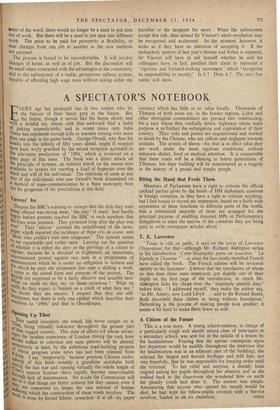°Peei ng Up Tibet Tii , h at useful invention, the wheel, has
never caught on in of'",!_t. being virtually unknown throughout the greater part ta 'Bat rugged country. This state of affairs (of whose advan- ai,ges the briefest experience of London during the rush hour suffice to convince any sane person) will be altered, o'felhorarily at least, by the ambitious road-building projects pel,\Yhese progress some news has just been released from skinks say ' temporarily ' because previous Chinese under- , da lienks of this kind—notably a grandiose autobahn built is the last war and running virtually the whole length of dill thro't s eastern frontier—have rapidly become unserviceable Be ugh lack of maintenance. No doubt the Communists will 'to thee‘.to it that things are better ordered but they cannot, even if fp! iniffie.„ are concerned to, lessen the vast amount of human °„,o w0,4198 which the construction of these roads involves. The currency which has little or no value locally. Thousands of Tibetans of both sexes (or, in the border regions, Lolos and other aboriginal communities) are pressed into constructing, for a race whom they cordially detest, highways whose main purpose is to further the subjugation and exploitation of their country. Their yaks and ponies are requisitioned and worked to death by the Chinese, who are callous and negligent towards animals. The armies of slaves—for that is in effect what they are—work under the most rigorous conditions,' without adequate shelter, food or medical attention. It is conceivable that these roads will be a blessing to future generations of Tibetans; but their building will be remembered as a tragedy in the history of a proud and simple people.


































 Previous page
Previous page